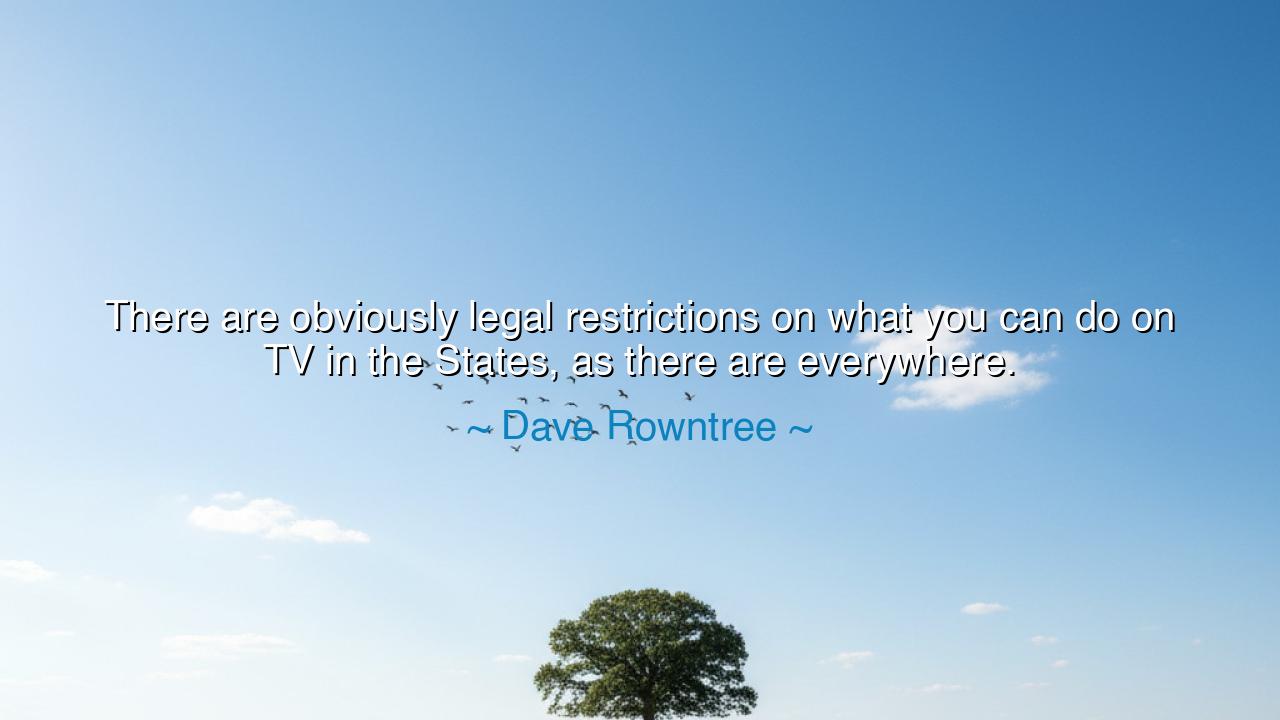
There are obviously legal restrictions on what you can do on TV
There are obviously legal restrictions on what you can do on TV in the States, as there are everywhere.






When Dave Rowntree said, “There are obviously legal restrictions on what you can do on TV in the States, as there are everywhere,” he was not merely commenting on media law — he was reflecting upon the eternal dance between freedom and restraint, between the artist’s desire to express and the society’s duty to define its boundaries. His words, calm and matter-of-fact, conceal within them a deep and ancient truth: that every act of creation exists within a framework, and that even liberty — the most cherished of human ideals — must coexist with responsibility and order.
The origin of this quote lies in the world of entertainment and communication, a sphere where creativity meets the collective conscience. Rowntree, a musician and later a public figure, spoke of the legal limits that shape media expression — limits not unique to America, but shared across all nations. His acknowledgment that “there are everywhere” such restrictions is a recognition of the universal human impulse to balance expression with protection. For in every age, societies have grappled with the question: how much truth, how much art, how much provocation can be shown before chaos ensues? The line between illumination and offense has always been drawn, erased, and drawn again — not out of tyranny, but out of the fragile need for harmony.
In ancient times, this struggle was no less real. When the poets of Athens took to the stage to mock kings and question the gods, their words carried both liberation and peril. Aristophanes, in his comedies, dared to ridicule politicians and philosophers alike, and though his wit delighted the people, it also angered the powerful. The city permitted satire, yet it also feared its consequences. Thus, even in the birthplace of democracy, there were boundaries on speech — invisible yet formidable — a reminder that no society is without limits. What Rowntree observes about modern television was true even then: every form of storytelling exists within the moral laws of its time.
And yet, the tension between law and creativity is not a burden, but a crucible. From within restriction, art often finds its greatest power. The painter constrained by canvas, the writer by language, the performer by propriety — all find in limitation the spark of innovation. Rowntree’s statement, then, is not one of complaint but of recognition: that these legal boundaries are the shape against which imagination presses. Just as rivers find strength in their banks, so too does expression find force when guided by ethical and legal form. To have no boundary at all is not freedom, but chaos, for unbridled expression can destroy the very audience it seeks to reach.
Consider the case of Orson Welles and his 1938 radio broadcast of The War of the Worlds. Though the performance was art, it blurred the lines of reality so effectively that panic swept across the nation. Welles did not break a law, but his broadcast revealed a truth older than law itself — that words and images, once released into the public sphere, wield power beyond the intention of their maker. Afterward, new rules were written, new restrictions applied, not to silence creativity, but to protect trust and stability. Thus, as Rowntree wisely notes, every society, from ancient theater to modern television, must temper freedom with foresight.
There is a deeper wisdom still in his words. He reminds us that law and liberty are not enemies, but partners in civilization. The law, at its best, is the guardian of fairness, ensuring that the powerful do not drown out the vulnerable, that decency does not fall to spectacle. In art and media, these laws safeguard the dignity of both the creator and the audience. When we chafe against them, we must remember that they were born not out of hatred for freedom, but out of love for balance — a truth that the ancients themselves carved into stone when they built temples to both Justice and the Muses.
So let the teaching be this: freedom thrives within form. Whether in art, governance, or the soul, unbounded expression without wisdom leads to ruin. Learn, then, to see restriction not as a cage, but as a compass. The artist, the thinker, the speaker — all must walk the edge between what can be said and what should be said. For it is on that edge that greatness is born. And as Dave Rowntree reminds us, no nation, no age, and no person stands outside this truth — that wherever there is voice, there will be law; and wherever there is law, there must still be the courage to speak.






AAdministratorAdministrator
Welcome, honored guests. Please leave a comment, we will respond soon